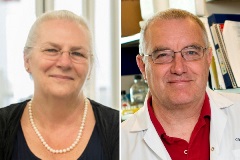MOHCCN Pan-Canadian Projects underway with announcement of first grant recipients

The Marathon of Hope Cancer Centres Network is happy to introduce the first four teams to receive funding through its Pan-Canadian Projects program, marking the official launch of a new program that will unite researchers and clinicians from multiple provinces to work on projects that accelerate precision medicine for cancer in Canada.
In total, the Network will fund 20 such groups, representing a multi-million-dollar investment over the next three years that will contribute roughly 6,000 cases to the MOHCCN Gold Cohort, the largest and most complete cancer case resource in Canada. Remaining projects will be announced over the next few months as Network agreements are signed.
“Until now, the bulk of our investment has supported projects within specific geographic regions, helping to create synergies within those regions and establishing the policy and technological framework needed to generate data nationally according to Network standards,” says Dr. André Veillette, executive director of the MOHCCN. “Now that these synergies exist, we are expanding our investment to projects that unite these regions, integrating researchers and clinicians in new and exciting ways.”
“This is where we will see the true impact of the Network on the Canadian cancer research and care landscape, which is why we are extremely excited to make this announcement.”
Introducing the first recipients
These projects will last three years. In the next year, these first four groups will receive a total of $1,212,000 from the Network, with matches from partner institutions adding up to a total investment of $3,451,587. Further funding over the following two years will be determined based on the amount of cases that each group is able to contribute to the MOHCCN Gold Cohort.
Three of these groups will focus on blood cancers, while the last will focus on solid tumours.
The first project, co-led by Drs. Aly Karsan and David Sanford at the BC Cancer Research Institute, will focus on acute myeloid leukemia. Using MOHCCN funding, the group, which includes collaborators in Toronto and Montreal, will perform whole genome and whole transcriptome sequencing of samples collected from patients with AML at diagnosis. Using other funding, the team will also perform these test at the time of recurrence. This will help to better understand why some patients fail treatment and seeks to create evidence to develop tests that predict how patients will respond to treatment early on.
The second project, led by Dr. Lambert Busque at the Maisonneuve-Rosemont Research Center in Montreal, focuses on non-Hodgkins Lymphoma. This project will use genomic, transcriptomic and clinical data to determine if there are markers that could predict if patients will respond to common first-line therapies used for this disease, or whether they should be quickly put onto second line treatments such as CAR-T cell immunotherapies. Collaborators for this project are located in Montreal, Ottawa, Winnipeg, Toronto, Hamilton and Quebec City.
The third project, led by Dr. Natasha Szuber, who is also at the Maisonneuve-Rosemont Research Center in Montreal, will focus on a group of chronic blood cancers known as myeloproliferative neoplasms. More specifically, Dr. Szuber and collaborators in Calgary, Hamilton, Vancouver, Toronto and Montreal, will study a rare subtype these cancers, creating the first-ever national biobank of these rare diseases and using genomic and clinical data collected thanks to MOHCCN funding to match genomic events to clinical outcomes with the goal of improving patient risk categorization to personalize therapies and improve outcomes for these patients.
The fourth project, led by Dr. Philippe Bedard at the Princess Margaret Cancer Centre in Toronto, will use next generation sequencing to detect cells that survive first line treatments and go on the seed cancer recurrence. This cutting-edge approach, called detection of molecular residual disease, seeks to identify clinically occult fragments of tumour DNA in the bloodstream to intercept them before recurrence occurs. Collaborators from this project are located in Ontario, Quebec, British Columbia and New Brunswick.
About the MOHCCN Pan-Canadian Projects
The 20 groups that will eventually make up the MOHCCN Pan-Canadian Projects were selected after a two-year process that began with a call for White Papers in November 2021.
After an administrative review from network staff, White Paper authors were contacted for their authorization to share their proposals with members of the MOHCCN Scientific Questions Working Group (SQWG) and collaborators.
The SQWG reviewed the White Papers and identified four themes emerging from the proposals that would be the basis for future projects. These themes – (i) mechanisms of drug resistance, (ii) dynamic biomarkers, (iii) prospective treatment assignment based on molecular/immune characterization and (iv) understanding cancer biology of rare and understudied cancer subtypes – along with a review criterion for a Request for Applications, were then endorsed by MOHCCN Network Council, and a request for applications was sent out. Out of the 35 applications received, 20 groups were selected to receive funding after undergoing peer review.
“This is where we will see the true impact of the Network on the Canadian cancer research and care landscape, which is why we are extremely excited to make this announcement.”
Related Team Members
-
Aly
Project Leader
Karsan -
David
Project Leader
Sanford -
Stephen
Project Leader
Chia -
Philippe
Project LeaderMOHCCN Network CouncilWorking Group Member
Bedard -
Mark
Project LeaderWorking Group Member
Basik -
André
Executive Director
Veillette -
Natasha
Researcher
Szuber -
Rodney
Researcher
Ouellette -
Lambert
Researcher
Busque
Projects
-
Regional Consortia
Pan-Canadian Projects
- Canada Wide
Building on work done by Regional Consortia across the country, the Pan-Canadian Projects program unites researchers and clinicians from multiple provinces to work on projects that accelerate precisio...Read more
Related News
-

An incredible milestone! A letter from Dr. André Veillette
Today, we’re proud to announce that we’ve reached our initial goal of sequencing 15,000 cancer genomes. -

Marathon of Hope Cancer Centres Network launches its 2026 Health Informatics & Data Science Award competition
The Marathon of Hope Cancer Centres Network is excited to announce the launch of its 2026 funding competition for early career health informaticians and data scientists. -

Marathon of Hope Cancer Centres Network achieves goal of sequencing 15,000 genomes for game-changing cancer dataset
The Marathon of Hope Cancer Centres Network (MOHCCN), a pan-Canadian initiative led by the Terry Fox Research Institute and the Terry Fox Foundation, today announced that it had achieved its goal of s... -

Long-time Terry Fox-funded researchers, leaders and mentors Drs. Anne-Marie Mes-Masson and John Bell appointed to the Order of Canada
Drs. Anne-Marie Mes-Masson and John Bell, two distinguished researchers with deep and long-time connections to the Terry Fox Research Institute, have been appointed to the Order of Canada, one of the ...
